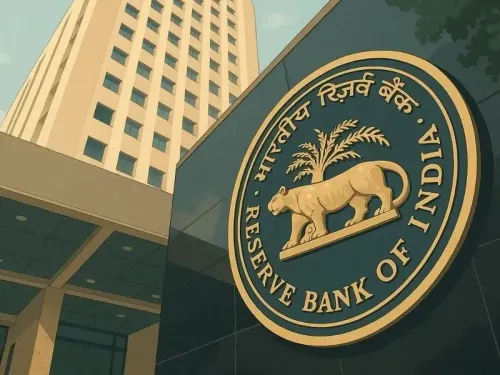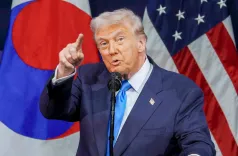Indian Stock Market Declines as Tariff Concerns Persist

Synopsis
Key Takeaways
- Indian stock indices opened lower due to tariff concerns.
- Nifty and Sensex experienced significant declines.
- FIIs continued selling equities while DIIs offered support.
- Investors should assess risks in a challenging market.
- Global developments may impact local markets.
Mumbai, Feb 12 (NationPress) The Indian benchmark indices commenced trading lower on Wednesday due to lingering worries over US President Donald Trump's tariff threats.
The Nifty 50 and Sensex both opened down by 0.1 percent, with the Nifty starting at 23,050 and the Sensex at 76,188 upon the opening bell.
By approximately 9:31 AM, the Sensex was trading down by 364.21 points or 0.48 percent at 75,929.39, while the Nifty dropped by 118 points or 0.52 percent to 22,953.80.
The primary draggers on the Nifty included Reliance Industries, ITC, and HDFC Bank. On the NSE, the Nifty Metal and Nifty IT saw gains, whereas Nifty Realty and Nifty Auto led the declines.
The rupee strengthened by 39 paise, opening at 86.44 against the US dollar, after closing at 86.83 on Tuesday.
Experts indicate that Trump's tariff issues have been affecting the markets for several days now.
“The pessimism on Dalal Street is palpable, with fears of further declines if the Nifty dips below the critical 23,000 mark. The Nifty has already decreased by 2.42 percent this year and is currently 12 percent below its all-time high from September 2024,” stated Prashanth Tapse, Senior VP (Research) at Mehta Equities.
A notable and widespread sell-off is being observed, with all major sectors suffering losses and remaining in negative territory for successive sessions.
This continued negative performance across sectors has created a daunting environment for investors, necessitating a comprehensive review of market conditions and personal investment strategies, remarked Sameet Chavan, Head Research, Technical and Derivative at Angel One.
As investors maneuver through this challenging landscape, it’s essential to evaluate potential risks while keeping up with global developments, according to experts.
In institutional trading, foreign institutional investors (FIIs) continued selling equities on February 11, offloading shares worth Rs 4,486 crore, while domestic institutional investors (DIIs) provided some support by purchasing equities worth Rs 4,001 crore on the same day.
The effects of these transactions on market direction will be closely observed, noted Aakash Shah from Choice Broking.
In Asian markets, South Korean stocks traded slightly higher, driven by institutional buying, despite concerns over the repercussions of Trump's extensive tariffs on the economy and related industries.










